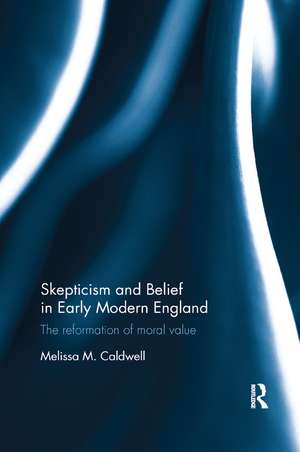Skepticism and Belief in Early Modern England: The Reformation of Moral Value
Autor Melissa M. Caldwellen Limba Engleză Paperback – 12 dec 2019
| Toate formatele și edițiile | Preț | Express |
|---|---|---|
| Paperback (1) | 389.66 lei 6-8 săpt. | |
| Taylor & Francis – 12 dec 2019 | 389.66 lei 6-8 săpt. | |
| Hardback (1) | 820.32 lei 6-8 săpt. | |
| Taylor & Francis – 19 sep 2016 | 820.32 lei 6-8 săpt. |
Preț: 389.66 lei
Nou
Puncte Express: 584
Preț estimativ în valută:
74.56€ • 77.85$ • 61.71£
74.56€ • 77.85$ • 61.71£
Carte tipărită la comandă
Livrare economică 04-18 aprilie
Preluare comenzi: 021 569.72.76
Specificații
ISBN-13: 9780367880835
ISBN-10: 0367880830
Pagini: 262
Dimensiuni: 152 x 229 x 21 mm
Greutate: 0.45 kg
Ediția:1
Editura: Taylor & Francis
Colecția Routledge
Locul publicării:Oxford, United Kingdom
ISBN-10: 0367880830
Pagini: 262
Dimensiuni: 152 x 229 x 21 mm
Greutate: 0.45 kg
Ediția:1
Editura: Taylor & Francis
Colecția Routledge
Locul publicării:Oxford, United Kingdom
Public țintă
Postgraduate and UndergraduateCuprins
Table of Contents
Introduction: Skepticism, Belief, and the English Church
I. The Value of Uncertainty in Reformation England
II. The Histories of Early Modern Skepticism
III. Reclaiming Polemical Literature for the History of Ethics
Chapter 1: Skeptical Polemics?: Erasmian Reform and the Development of Early Tudor Skepticism
I. Criterions of Judgment Before the Reformation
II. Equity, the Third Stoic Paradox, and Emerging Theories of Reform in Utopia
III. The Skeptical Discourses of Reform in the 1520s
IV. Reform and the Uncertain Uses of Fiction
Chapter 2: Print, Probability, and the Changing Nature of Religious Belief in the 1520s
I. Print and the Changing Nature of Belief
II. More’s Textual Skepticism and the Destabilizing Fictions of the Printed Word
III. Normative Fiction and the Assurance of Probability
IV. Print Culture and the Simulation of Consensus
Chapter 3: Richard Hooker and the Value of Doubt in Post-Reformation Ethics
I. The Elizabethan Church and Post-Reformation Ethics
II. Doubt, Adiaphora, and Hooker’s Attack on Sola Scriptura
III. Galen, Contrariety, and Methods of Reform
IV. Hooker’s Skeptical Method of Reform
V. Schism, Pragmatism, and the Emergence of Atheism
Chapter 4: Thomas Nashe, Atheism, and the Problem of Literacy
I. Nashe and the Histories of Skepticism
II. The Preface to Astrophil and Stella, Print, and Nashe’s Writer
III. Misreading Nature: Plain Dealing and the Breakdown of Analogical Thinking in Christs Teares
IV. Atheism and Elizabethan Policy
V. Moral Reform and the Limits of Skepticism
Chapter 5: Native Ears: John Donne and the Reformed Audience
I. The Art of Hearing and the
Introduction: Skepticism, Belief, and the English Church
I. The Value of Uncertainty in Reformation England
II. The Histories of Early Modern Skepticism
III. Reclaiming Polemical Literature for the History of Ethics
Chapter 1: Skeptical Polemics?: Erasmian Reform and the Development of Early Tudor Skepticism
I. Criterions of Judgment Before the Reformation
II. Equity, the Third Stoic Paradox, and Emerging Theories of Reform in Utopia
III. The Skeptical Discourses of Reform in the 1520s
IV. Reform and the Uncertain Uses of Fiction
Chapter 2: Print, Probability, and the Changing Nature of Religious Belief in the 1520s
I. Print and the Changing Nature of Belief
II. More’s Textual Skepticism and the Destabilizing Fictions of the Printed Word
III. Normative Fiction and the Assurance of Probability
IV. Print Culture and the Simulation of Consensus
Chapter 3: Richard Hooker and the Value of Doubt in Post-Reformation Ethics
I. The Elizabethan Church and Post-Reformation Ethics
II. Doubt, Adiaphora, and Hooker’s Attack on Sola Scriptura
III. Galen, Contrariety, and Methods of Reform
IV. Hooker’s Skeptical Method of Reform
V. Schism, Pragmatism, and the Emergence of Atheism
Chapter 4: Thomas Nashe, Atheism, and the Problem of Literacy
I. Nashe and the Histories of Skepticism
II. The Preface to Astrophil and Stella, Print, and Nashe’s Writer
III. Misreading Nature: Plain Dealing and the Breakdown of Analogical Thinking in Christs Teares
IV. Atheism and Elizabethan Policy
V. Moral Reform and the Limits of Skepticism
Chapter 5: Native Ears: John Donne and the Reformed Audience
I. The Art of Hearing and the
Notă biografică
Melissa M. Caldwell is Associate Professor of English and Director of Undergraduate Studies at Eastern Illinois University, USA.
Descriere
Analyzing a variety of literature-including religious polemic, dialogue, pamphlets, sermons, and treatises-Melissa Caldwell argues that a skeptical mode of thinking is embedded in the literary and rhetorical choices made by English writers who straddle the project of reform and the maintenance of orthodoxy after the Reformation in England. Far from
